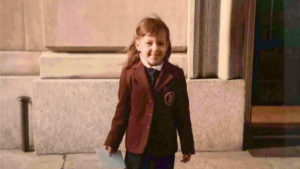Feminists, when I was growing up, used to encourage girls to “get loud” and rail against the social pressure to be compliant and “nice”. We were taught to push back against the idea that women need to be appealing to men because their comfort mattered more than ours.
Now, we live in a radically different world. A world in which a generation of young women is being taught to disregard the fear they might feel in a threatening situation. They are told not to trust their intuition. And they are called bigots and sent death threats if they suggest that they feel uncomfortable in their bathrooms and changing rooms — or even in shelters for survivors of sexual abuse.
As a sexual assault survivor myself, I fought back tears while watching Paula Scanlan testify before a House Judiciary subcommittee about her experience of being on the University of Pennsylvania’s women’s swimming team — with the transgender athlete Lia Thomas. “I know of women with sexual trauma who are adversely impacted by having biological males in their locker room without their consent. I know this because I am one of these women.”
I felt rage, too. How outrageous that Scanlan should have to defend her desire to be free of biological males in a female changing room. How dare her university send her to psychotherapy in an “attempt to reeducate [me] to become comfortable with the idea of undressing in front of a male”? I find it hard to believe that, five years ago, feminists’ rallying cry was #BelieveAllWomen.
Clearly, Scanlan does too. “Let us not forget the viral #MeToo movement that empowered female victims to speak up,” she said. “It trained a spotlight on the widespread prevalence of sexual assault and abuse, including in scholarly and educational institutions … many policies pushed today completely ignore my experiences and many women like me.” In the space of five years, we’ve gone from #BelieveAllWomen to: “Believe all women, especially if they are men.”
How have we regressed so rapidly? Everyone from Oprah downwards preached to my generation of women to listen to your gut; listen to your instinct; listen to that voice whispering “Get out!” Back in 1997, she interviewed Gavin de Becker, whose book The Gift of Fear — a guide to understanding how your instincts about other people can keep you safe — became a bestseller. During her show, he summed it up like this: “Someone who doesn’t hear ‘no’ is trying to control you.”
Oprah looked out at the audience. “Did y’all hear that? Gavin, you need to say it again.”
Such was the impact of the book that, in 2008, Oprah did an hour-long show to commemorate its tenth anniversary. During it, de Becker repeated a line from his book, distilled from a Margaret Atwood lecture: “At core, men are afraid women will laugh at them, while at core, women are afraid men will kill them.”
I understood this. I was taught to get out of any threatening situation as soon as possible. If you’re alone in a room and a man enters and you don’t feel safe? Leave. If you’re walking at night and feel the instinct to escape? Just run. It doesn’t matter if you’re wrong, because what if you’re right? I was told to ignore that little voice at my peril. My mother raised me and my sisters to scream and run like hell if a stranger asked us to get in their car. “Because if you end up in a trunk, you’re dead.”
As de Becker says: “Can you imagine an animal in the wilderness overtaken with fear and saying ‘Oh it’s probably nothing.’ But we do that every day.” In his 1997 Oprah appearance, he argues that the real information we should be giving women and children is: “Honour your own fear and teach them that it’s important, that their own internal voice is important.”
Where is Oprah now?
The message today’s young women are getting is that if their inner voice says it feels wrong when someone with a penis undresses in front of them, or is present when they undress, in a space designated for women, there is something wrong with them. Scanlan said in her testimony: “We, the women, were the problem, not the victims. We were expected to conform, to move over and shut up. Our feelings didn’t matter. The university was gaslighting and fearmongering women to validate the feelings and identity of a male.”
It appears that institutions, politicians and progressives are happy to sacrifice women at the altar of inclusivity. They demand we keep quiet when we feel uncomfortable or unsafe. Ironically, instead of teaching us to keep ourselves safe and fear violation, the women’s movement teaches us to fear being labelled as bigots. Paula Scanlan and collegiate swimmer Riley Gaines have been called transphobes for objecting to someone striding around with his penis on show in a locker room designated for women.
We are setting a dangerous precedent. Think about the young women watching the way that Scanlan and Gaines are being treated. They will surely conclude that they must suffer to accommodate the small handful of males that want to make everything about them. They are now being given access to female prisons, domestic abuse shelters, rape centres, locker rooms, spas and public toilets, as well as changing rooms.
It would be absurd to assume that all trans-identified male-bodied people are looking for ways to abuse girls or women; it is equally absurd — and naïve — to think that male predators won’t exploit this system. But what I find particularly alarming is that it teaches women in general not to trust themselves. It tells us to ignore the discomfort triggered at a subconscious level. It encourages us to ignore our instincts. When a woman senses danger the last thing she needs is for her judgment to be clouded by another fear: the fear of social death if she acts to protect herself.
And all of us who witness the abuse that women who speak up are being subjected to are expected to remain silent. All of us whose little voices are telling us that there’s something wrong with prioritising men’s feelings over women’s safety are told we are wrong.
But my gift of fear is telling me to resist being intimidated into submission. To teach young women and my own daughter to honour that voice, that intuition. To stand behind women like Paula Scanlan who are also resisting. And to say, “No.”
Disclaimer
Some of the posts we share are controversial and we do not necessarily agree with them in the whole extend. Sometimes we agree with the content or part of it but we do not agree with the narration or language. Nevertheless we find them somehow interesting, valuable and/or informative or we share them, because we strongly believe in freedom of speech, free press and journalism. We strongly encourage you to have a critical approach to all the content, do your own research and analysis to build your own opinion.
We would be glad to have your feedback.
Source: UnHerd Read the original article here: https://unherd.com/



